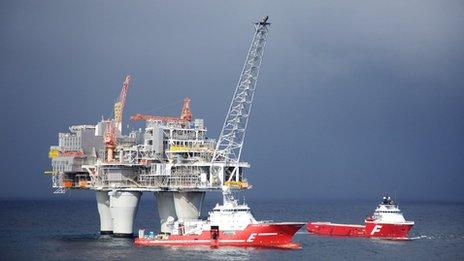Has the UK squandered its North Sea riches?
- Published

For the Norwegians, the Meadowhall shopping centre investment will make up a relatively small part of a global property portfolio
Norway's £400bn ($640bn) oil fund has paid £348m to acquire a 50% stake in Sheffield's Meadowhall shopping centre.
The purchase raises, yet again, the question of whether the UK has squandered the riches of the North Sea.
Why is Norwegian oil money being deployed to buy prize assets in the UK, while we have no oil money to spend in Norway?
In simple terms, during the oil boom, our governments spent their North Sea winnings on cutting national borrowing and keeping down taxes.
Whatever came in went straight into the day-to-day budget.
By contrast, for the past 16 years Norway has squirreled away the government's petroleum revenue - arising from levies on oil companies operating in Norway and from its stake in national energy giant Statoil - in a national oil fund.
Today it uses the income from the fund - just the income, mind - to cover 11% of its national spending.
And, ironically, now that the UK is buying Norwegian gas in large quantities, Britain too is contributing to Norway's colossal nest egg, one of the biggest sovereign wealth funds in the world.
Getting bigger

The oil fund's head of real estate, Karsten Kallevig, is eager to invest more in the UK
The Meadowhall acquisition, external is the result of a relatively new policy of buying into property around the world.
It comes after a £452m investment in London's Regent Street last year.
The global investment arm of the Government Pension Fund, as the oil fund is formally named, is the biggest investor in shares across Europe, so its holdings took a knock during the financial crisis.
Now, like Middle Eastern sovereign wealth funds, it is picking up trophy properties.
"The purchase gives us exposure to one of the largest and most dominant shopping centres in the UK," says Karsten Kallevig, chief investment officer for real estate.
So the taxpayers of Norway will be saying a big thank you to the shoppers of Sheffield.
By spending in Meadowhall, the shoppers will help local stores pay their rent, and Norwegians will pocket a share of the rental income.
The word "pension" in the oil fund's official name is a bit misleading as the benefits for Norwegians is not restricted to pensions.
What happens is that up to 4% of the fund, or £16bn currently, is diverted each year to subsidise government spending.
In effect, it keeps hospital beds open and helps pay for social benefits.
The fund keeps growing, though, because levies on oil and gas production and on oil companies bring in an extra £30bn annually.
As the oil carries on gushing and oil prices stay high, the Norwegian nest egg cannot stop getting bigger.
British equivalent?
In the UK, the Callaghan government of the 1970s flirted with the idea of setting up an oil fund, but in a time of mounting economic crisis it was too tempting just to grab the money.

Selling North Sea gas in the UK helps fill the oil fund's coffers
And it has been ever since.
Norway started on the same route, but had second thoughts after the oil price collapsed in the 1980s.
The idea of its fund was to try to smooth out the bumps from fluctuating prices and preserve the gains from the oil bonanza for future generations.
To be fair, the Norwegians had more money to play with. Their oil production is higher and the proceeds are enormous in comparison to the country's population of just five million.
Could the British have done it? Well, the Shetland Islands did.
When oil started arriving at Sullom Voe and ships docked nearby, there was a flood of cash.
The council set up an oil fund that still stands at £185m today, even after upgrading roads, ferry terminals and local swimming pools.
In Scotland, the Scottish National Party's Alex Salmond has long advocated setting up a special fund supported by North Sea oil revenues.
However, it is unclear when that could happen, given the pressure on the Scottish government's budget.
And for the UK as a whole, now that North Sea oil is well past its peak, there is little prospect of ever amassing a fund like Norway's.